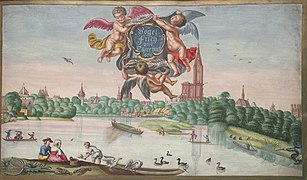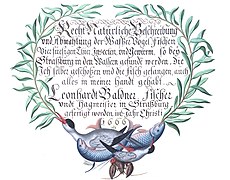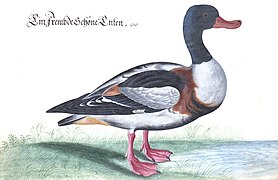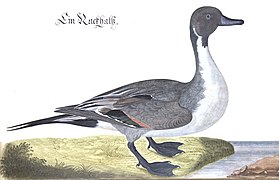Leonhard Baldner

Leonhard Baldner or Leonard Baltner (1612 – 1 February 1694) was a Strasbourg fisherman and naturalist who produced a hand-written illustrated book on the fishes, birds, and mammals titled Vogel-, Fisch- und Thierbuch. Only six manuscript copies are now known to exist, two are dated 1653 and the other four 1666. He was one of the early pioneers to use glass aquariums to study fish in life. He was also possibly the first to write on the migration and life-history of the salmon.
Biography
The exact date of birth of Baldner is unknown but he was born in an old fisher family in Strasbourg. He married Salome, daughter of Hans Michael Fries on January 25, 1636, and had four children. He married his second wife Anna Ursula, daughter of a goldsmith, Abraham Sprengel in 1650 and they had four children. He worked as a toll collector, later a forester and then a forest manager. After the death of his second wife, he married Barbara, daughter of Benedictus Grossen, a professor of Hebrew. They too had four children of whom the youngest son, Andreas born in February 1673 transcribed the manuscripts of his father. Baldner died on February 1, 1694[1] and is buried in the Saint-Urbain cemetery in Strasbourg.[2]
The bird, fish, and animal book (1666)
The original manuscript drawn and written by the artist was inherited by Baldner's youngest son who had it until 1687. It was then purchased by organ builder Silbermann who donated it to the city of Strasbourg. The copy was destroyed on the night of August 24, 1870, during a siege by the Prussians.[3] A facsimile edition of Baldner's manuscript was published by Robert Lauterborn in 1903 although there are slight differences between the plates among the various surviving manuscript editions.[4] It included three parts; the first on birds included 68 species while the second dealt with 45 fishes and crustaceans. The third part included quadrupeds and other animals. His writings were based on personal observation and he did not rely on reports by others.[5] He hired a Strasbourg artist, Johann Georg Walther,[6] to illustrate the book. At least one and probably two copies of the book were obtained by Francis Willughby in 1663. The German text was translated into English for Willughby and his collaborator John Ray by Frederick Slare.[7][8]
-
Cover page
-
Title
-
Common shelduck
-
Pintail
References
- S2CID 191873312.
- S2CID 143938387.
- ^ Gradoz, Pierre (2011). "Léonard Baldner (1612-1694), tel qu'il fut présenté lors de la conférence-projection faite à la Société d'histoire naturelle et d'ethnographie le 19 novembre 2010" (PDF). Bulletin de la Société d'Histoire Naturelle et d'ethnographie de Colmar. 70: 49–52.
- .
- ^ Nellen, Walter; Dulčić, Jakov (2008). "Evolutionary steps in ichthyology and new challenges". Acta Adriatica. 49 (3): 201–232.
- ISBN 978-90-04-28531-6.
- JSTOR 4074378.
- JSTOR 4078696.
Further reading
- Reiber, Ferdinand (1886–1888). "L'Histoire naturelle des eaux strasbourgeoises, de Léonard Baldner (1666)". Bulletin de la Société d'histoire naturelle de Colmar (in French): 1–114. Also published as a monograph:
- Reiber, Ferdinand (1888). L'Histoire naturelle des eaux strasbourgeoises, de Léonard Baldner (1666) (in French). Strasbourg: J. Noiriel.
- Baldner, Leonhard; Lauterborn, Robert (1903). Das Vogel-Fisch-und Thierbuch des Strassburger Fischers Leonhard Baldner aus dem Jahre 1666 (in German). Ludwigshafen am Rhein: Lauterborn. OCLC 632324817.
- Baldner, Leonhard; Lauterborn, Robert (1974). Vogel-, Fisch- und Thierbuch : Handschrift 2° Ms. Phys. et hist. nat. 3 der Murhardschen Bibliothek der Stadt Kassel und Landesbibliothek (in German). Stuttgart: Müller and Schindler. OCLC 637359406.
- Gurney, John Henry (1921). Early annals of ornithology. London: H.F. & G. Witherby. pp. 197–200.
External links
- Scan of the copy of Vogel-, Fisch- und Thierbuch held by the University of Kassel
- Recht natÿrliche Beschreibung und Abmalung der Wasser Vögel, Fischen, Vierfüssigen Thieren, Insecten, und Gewürm, so beÿ Strassburg in den Wassern gefunden werden, welche ich selber geschossen, gefangen und in mein eigner Hand gehabt Catalogue entry for a copy of Baldner's book held by Brown University library. As well as the 115 watercolour paintings in the book itself, the library hold a collection of 228 additional drawings by various unidentified artists.




